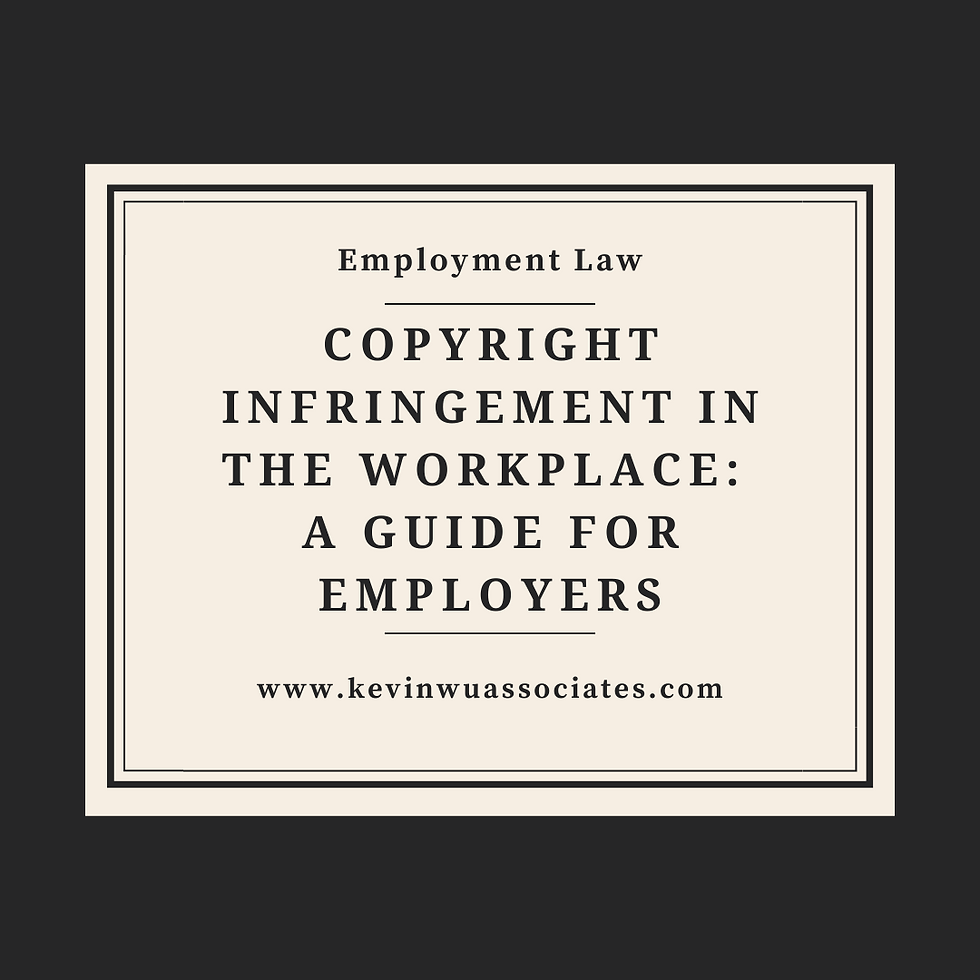Key Amendments to the Industrial Relations Act 1967
- Kevin Wu & Associates

- May 9, 2022
- 4 min read
Updated: Sep 10, 2024
The Industrial Relations (Amendment) Act 2020 (“IRA 2020”) made some crucial amendments to the to the Industrial Relations Act 1967 (“the Act”) and the main amendments with regard to the Act, which came into effect on 1st January 2021 are summarized below:-
a. Section 8(2) of IRA 2020 - Automatic Referral of unfair dismissal cases to the Industrial Court
An employee who considers himself to have been dismissed without just cause or excuse, may make a written representation to the Director General of the Industrial Relations Department to seek reinstatement, thereafter the Industrial Relations Department will then hold a conciliation meeting between the employee and the employer to determine whether the matter can be amicably resolved. If the matter cannot be amicably resolved, the Director General will then refer the representation to the Minister of Human Resources. The Minister then had the discretion to refer the representation to the Industrial Court for determination.
A representation would be automatically referred to the Industrial Court for determination unless the employer and employee are able to resolve the matter amicably at the conciliation meeting that would essentially speed up the dispute resolution process which would benefit an employee who has been unfairly dismissed.
b. Section 20(6) of IRA 2020 - Representation of Employers or Workmen at Conciliation Meetings at Industrial Relation Department
Following the amendment, both employers and workmen can now be represented by any other person (except an advocate and solicitor) at conciliation meetings at the Industrial Relations Department in respect of representations made under Section 20 of the Act. The representative must be authorised in writing by the employer/workman concerned and permitted by the DGI to attend the conciliation.
c. Section 20(6A) of IRA 2020 - Next of Kin May Apply for An Order To Appoint A Guardian For A Workman Under Mental Disability
Effective 1 January 2021, where a workman suffers from mental disability, his next of kin may apply to the High Court to appoint a guardian ad litem for the workman for the purposes of the conciliation process and/or during proceedings at the Industrial Court.
d. Section 29 of IRA 2020 - Continuation of Proceedings after Claimant’s death
Prior to the amendment, a claim made by a workman at the Industrial Court would diminish upon his death.
Following the amendments in the Act, the Industrial Court may continue with proceedings brought by a workman notwithstanding his death and pursuant to Section 30(6)(b) of IRA 2020, the Court in making an award in respect of a deceased workman, shall have the power to award backwages or compensation in lieu of reinstatement or both to his next-of-kin.
e. Section 29 (da) of IRA 2020 - Court’s Discretion to Determine The Date of Termination (Section 29 (da) of the IRA 2020)
Before IRA 2020 was amended, the Industrial Court was not allowed to amend nor determine the date of dismissal and that the date of dismissal would follow the date stated in the Ministerial Reference.
Following the IRA 2020, a case can now be heard even though the date of dismissal is being disputed by the parties or is incorrect and the Industrial Court is vest with the power to determine the date of dismissal.
f. Section 30 of IRA 2020 - Interest Rate at 8% Per Annum on Awards
Under the Act, Industrial Court awards did not carry any fixed interest.
Following the amendments, the Industrial Court may now impose interest (at 8% per annum, or a lesser rate as the Court directs) for awards relating to monetary sum.
Further, the penalty for non-compliance of an Industrial Court award is also amended to be harsher.
g. Court Is No Longer Bound by The Second Schedule of The Act For Dismissal that
Relates to Sections 4, 5 or 7 (Section 30(6a) of the Act)
The Second Schedule of the Act sets out the factors for consideration by the Industrial Court in making an award. Pursuant to Schedule 2, backwages which are awarded by the Court are limited to 24 months from the date of dismissal.
With the amendment to the Act, dismissal that relates to or as a result of the trade union activities under Section 4, 5 or 7 of the Act are no longer subject to the Second Schedule of the Act. In these instances, the Industrial Court is no longer limited to 24 months in its award for backwages.
h. Section 33C IRA 2020 - Appeals from the Industrial Court
Previously under the Act, the general practice in seeking to challenge an award of the Industrial Court under the Act has been by way of judicial review.
This amendment will not affect existing cases filed before 1 January 2021 and for such cases, the existing option of judicial review will continue to apply.
Presently under the new Section 33C IRA, the Amendment Act enables aggrieved parties to directly appeal an Industrial Court award to the High Court, insofar as the appeal is made within 14 days of the grant of the award. The appeals process adopts similar process laid out in the Rules of Court 2012 as the appeal will be treated as if it were an appeal from a decision of the Sessions Court.
i. Section 56 IRA 2020 - Increase of penalty for non-compliance with award
The penalty for non-compliance with an Industrial Court Award has been increased to a fine not exceeding RM50,000.
Authored by Nahvinah Selvaraj and Caylene On
Kindly note that this legal article does not, and is not intended to, constitute formal legal advice by the Firm, instead all information, content and materials available on this site are for general informational purposes only. If readers require further clarification or legal advice, please email office@kevinwuassociates.com.




